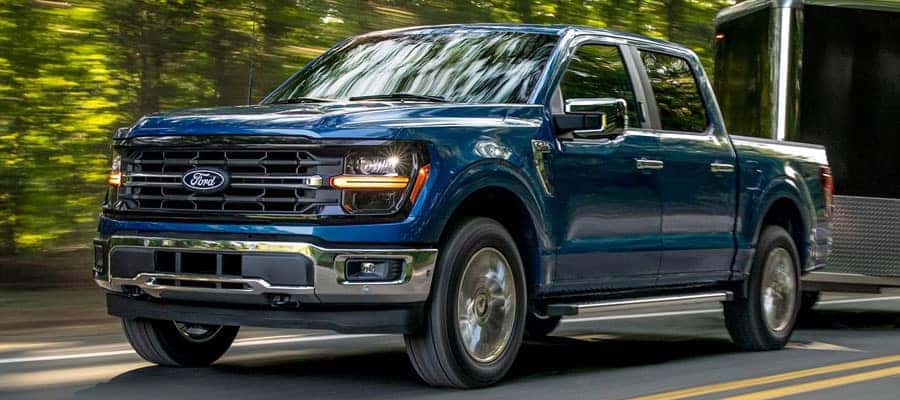As an Amazon Associate, I earn from qualifying purchases
Are you curious about how many miles per gallon your Ford F150 can really deliver? Whether you’re planning your next road trip or just want to save money on fuel, knowing your truck’s MPG is key.
You’ll discover the real fuel efficiency of different Ford F150 models, what affects their gas mileage, and simple tips to get the most out of every gallon. Keep reading to find out how your F150 can work smarter for you and your wallet.
Ford F150 Fuel Efficiency Basics
The Ford F150 is a popular truck known for its power and durability. Fuel efficiency is a key factor for many buyers. Understanding how the F150 uses fuel helps you choose the right model.
Fuel economy depends on several factors. Engine type, driving style, and load all affect miles per gallon (MPG). Knowing these basics can save money on gas over time.
Engine Options And Their Impact On Mpg
The F150 offers different engines. Some focus on power, others on fuel savings. Smaller engines usually get better MPG. V6 engines often provide a good balance of power and efficiency. Larger V8 engines use more fuel but deliver more strength.
Drive Types And Fuel Economy
The F150 comes with two drive types: two-wheel drive (2WD) and four-wheel drive (4WD). 2WD models generally get better fuel economy. 4WD adds weight and uses more fuel but is better for tough conditions.
How Load And Towing Affect Mpg
Carrying heavy loads or towing reduces fuel efficiency. The engine works harder, using more gas. Light loads or no towing improve MPG. Planning trips with weight in mind helps save fuel.
Engine Options And Their Mpg
The Ford F-150 offers several engine choices. Each engine delivers different fuel efficiency. Understanding these options helps you pick the best fit for your needs. Below are the main engines and their miles per gallon (MPG) ratings.
3.3l V6 Engine
This is the base engine in the F-150 lineup. It provides solid power for daily driving. The 3.3L V6 gets about 20 MPG in the city. On the highway, it improves to around 24 MPG. This engine balances power and fuel savings well.
2.7l Ecoboost V6
The 2.7L EcoBoost is a turbocharged engine. It offers more power without much extra fuel use. This engine achieves about 20 MPG city and 26 MPG highway. It suits drivers who want better performance and decent fuel economy.
5.0l V8 Engine
The 5.0L V8 delivers strong towing and hauling power. This engine consumes more fuel than the V6 options. Its MPG rating is around 17 in the city and 23 on the highway. Ideal for heavy-duty tasks but less efficient.
3.5l Ecoboost V6
The 3.5L EcoBoost is a popular choice for power and efficiency. It uses twin turbochargers for extra strength. This engine gets about 18 MPG city and 24 MPG highway. It balances power needs with reasonable fuel use.
3.0l Power Stroke Diesel
This diesel engine focuses on fuel economy and torque. It delivers excellent MPG for long drives and heavy loads. Expect around 20 MPG in the city and 27 MPG on highways. A smart choice for those who drive often.
Impact Of Drivetrain On Mileage
The drivetrain plays a key role in the fuel economy of a Ford F150. It affects how power moves from the engine to the wheels. Different drivetrains use fuel differently, leading to varied miles per gallon (mpg).
Choosing the right drivetrain can save fuel and money. It also changes how the truck handles different road conditions. Understanding these differences helps in making a smart choice.
Two-wheel Drive (2wd) Efficiency
Two-wheel drive trucks send power only to the rear wheels. This design is lighter and simpler. It usually offers better fuel economy than four-wheel drive models. Less weight means the engine uses less fuel. Ideal for city driving and highways.
Four-wheel Drive (4wd) Fuel Use
Four-wheel drive powers all four wheels at once. It helps in rough or slippery conditions. But it adds weight and mechanical parts. These extras cause more fuel use. 4WD trucks often have lower mpg than 2WD versions.
All-wheel Drive (awd) And Mileage
All-wheel drive sends power to wheels as needed. It adjusts automatically for traction. AWD adds weight but less than 4WD. Fuel economy sits between 2WD and 4WD trucks. Good for mixed driving conditions.
Fuel Economy By Model Year
Fuel economy changes with each Ford F150 model year. Engine upgrades, technology, and design affect miles per gallon (MPG). Drivers want to know how much fuel their truck uses yearly.
Older models usually have lower MPG. Newer models often improve fuel efficiency. This section breaks down MPG by model year.
Fuel Economy Of Ford F150 Models Before 2010
Early F150 trucks had basic engines. Average MPG ranged from 12 to 16. These trucks focused more on power than fuel saving. Most used larger V8 engines.
Fuel Economy Of Ford F150 Models From 2010 To 2015
Ford added new engines and tech in these years. MPG improved to about 15 to 19. EcoBoost engines started appearing. These engines use turbocharging for better fuel use.
Fuel Economy Of Ford F150 Models From 2016 To 2020
New materials and designs made trucks lighter. MPG rose to 18 to 22 for many models. Hybrid versions also became available. These hybrids offer even better fuel savings.
Fuel Economy Of Ford F150 Models From 2021 And Later
Latest F150s focus on efficiency and power. MPG can reach up to 25 in some trims. More hybrid and electric options appear. Technology helps trucks use fuel smarter.
City Vs Highway Mpg Comparison
The Ford F-150 is a popular truck known for power and versatility. Fuel efficiency is a key factor for many buyers. Comparing city and highway miles per gallon (MPG) helps understand its fuel use better. City driving often uses more fuel due to frequent stops and starts. Highway driving usually offers better MPG because of steady speeds.
Knowing the difference between city and highway MPG can help plan trips and save money. It also shows how the F-150 performs in different driving conditions. Below, explore detailed MPG figures for city and highway driving.
City Mpg Of The Ford F-150
The Ford F-150’s city MPG varies by engine and model year. Most models get around 16 to 20 MPG in the city. The stop-and-go traffic lowers fuel efficiency. Features like turbocharged engines can improve city MPG slightly. Older models tend to have lower city MPG. Newer versions use technology to boost fuel economy in urban areas.
Highway Mpg Of The Ford F-150
Highway MPG is generally higher than city MPG for the F-150. Most trucks achieve about 22 to 26 MPG on highways. Steady speeds on highways reduce fuel consumption. Aerodynamics and engine tuning help improve highway MPG. Trucks with diesel engines often reach better highway mileage. Newer models show continuous improvement in highway fuel efficiency.
Factors Affecting City Vs Highway Mpg
Driving style impacts both city and highway MPG. Hard braking and rapid acceleration lower city MPG. Maintaining consistent speeds helps increase highway MPG. Payload and towing weight also affect fuel efficiency. Heavier loads reduce MPG in both conditions. Tire type and pressure can influence fuel consumption too.
Effect Of Towing On Fuel Efficiency
Towing a trailer lowers the Ford F150’s miles per gallon. Extra weight and wind resistance make the engine work harder. Expect fewer miles per gallon while pulling heavy loads.
How Towing Affects Fuel Consumption
Towing adds extra weight to the Ford F150. This weight forces the engine to work harder. As a result, the truck uses more fuel. The heavier the load, the lower the miles per gallon (mpg). Even a small trailer can reduce fuel efficiency noticeably.
Impact Of Aerodynamics While Towing
Trailers and large loads create wind resistance. This resistance makes the truck less aerodynamic. The engine burns more fuel to overcome this drag. Fuel economy drops especially at higher speeds. Keeping the load smooth and compact helps reduce this effect.
Driving Habits During Towing
Driving style changes when towing. Quick acceleration and hard braking waste fuel. Steady, slow speeds improve mpg. Using cruise control on highways can help maintain fuel efficiency. Proper gear selection also plays a role in saving fuel.
Engine And Transmission Influence
The type of engine affects towing fuel use. Larger engines may consume more fuel but handle heavy loads better. Automatic transmissions with tow modes can optimize fuel use. Regular maintenance keeps engine efficiency high during towing.
Role Of Vehicle Weight And Size
The weight and size of a Ford F150 play a major role in its fuel efficiency. Heavier trucks need more energy to move. This means the engine uses more fuel to carry the load. The bigger the truck, the more air it pushes aside while driving. This extra air resistance lowers miles per gallon (mpg).
Weight also affects how the truck accelerates and brakes. A heavy truck takes more fuel to speed up. It also requires stronger brakes, which can add to overall weight. These factors combine to reduce fuel economy.
The Impact Of Vehicle Weight On Fuel Economy
Weight directly affects how hard the engine works. A heavier Ford F150 burns more fuel than a lighter one. Carrying heavy loads or adding accessories raises the truck’s weight. This leads to lower mpg ratings. Reducing weight can help improve fuel efficiency.
How Size Affects Aerodynamics
Size influences the truck’s shape and air flow. Larger trucks face more air resistance. The Ford F150’s size creates drag that slows it down. This drag forces the engine to use more fuel. Smaller or more streamlined vehicles usually get better mpg.
Balancing Size, Weight, And Performance
The Ford F150 balances size and weight for strong performance. It must be tough enough for heavy jobs. Yet, it aims to keep fuel use reasonable. Engineers work to reduce weight without losing strength. This balance helps the truck deliver good mpg for its class.

Credit: www.hudsonford.com
Tips To Improve Ford F150 Mpg
Improving the miles per gallon (MPG) of your Ford F150 helps save money on fuel. Small changes make a big difference. These simple tips help your truck run more efficiently. Better fuel economy means fewer stops at the pump and less pollution.
Maintain Proper Tire Pressure
Check your tire pressure regularly. Low tires increase rolling resistance and lower MPG. Use the recommended tire pressure listed in your owner’s manual. Properly inflated tires improve fuel efficiency and vehicle safety.
Reduce Excess Weight
Remove heavy items from your truck bed and cab. Extra weight forces the engine to work harder. Less weight means better fuel economy. Carry only what you need to keep your F150 light.
Limit Idling Time
Turn off the engine when parked or waiting. Idling wastes fuel without moving the truck. Restarting your engine uses less fuel than idling for long periods. Save fuel by shutting off the engine during stops.
Use Cruise Control On Highways
Cruise control helps maintain a steady speed. Avoiding rapid acceleration and braking improves MPG. Use cruise control on long, flat highways to save fuel. This keeps your F150 running smoothly and efficiently.
Keep Up With Regular Maintenance
Change oil and air filters as scheduled. A clean engine runs better and uses less fuel. Worn spark plugs reduce fuel efficiency. Regular checkups keep your truck in top shape and improve MPG.
Common Fuel Efficiency Myths
Many people have ideas about how fuel efficiency works with the Ford F150. Some of these ideas are not true. These myths can confuse drivers about what to expect from their trucks. Clearing up these myths helps drivers make smart choices. It also helps understand the real fuel economy of the Ford F150.
Myth: Bigger Trucks Always Use More Fuel
People often think all big trucks waste a lot of fuel. The Ford F150 has models with good fuel economy. Smaller engines and newer technology help save fuel. Size alone does not decide how much fuel the truck uses.
Myth: 4×4 Trucks Are Less Fuel Efficient
Many believe 4×4 trucks always use more gas. Some 4×4 Ford F150 models have fuel-saving features. They switch to 2-wheel drive when 4-wheel drive is not needed. This helps save fuel on regular roads.
Myth: Using Air Conditioning Wastes Too Much Fuel
Some say air conditioning kills fuel economy. Modern trucks have efficient air conditioning systems. Running AC does use some fuel but not as much as many think. It is often better than driving with windows down at high speeds.
Myth: Idling Uses Less Fuel Than Restarting
Many think keeping the truck on wastes less fuel than turning it off. Modern engines use very little fuel when restarting. Turning off the engine during long waits saves fuel. Idling for more than a minute wastes more fuel than restarting.

Credit: www.bellford.com
Alternatives For Better Mileage
Many Ford F-150 owners want better fuel mileage without giving up power. There are several options to improve miles per gallon. Some choices involve different models or engines. Others focus on driving habits or upgrades. Each alternative can help save fuel and money.
Choosing A Hybrid Or Electric Model
Ford offers hybrid versions of the F-150. These trucks combine gas engines with electric motors. They use less fuel on city roads. Electric-only driving reduces gas use. The hybrid system also recovers energy when braking. This option gives better mileage than traditional engines.
Opting For Smaller Engine Options
The F-150 has several engine sizes. Smaller engines usually use less fuel. For example, a 2.7L V6 engine gets better mileage than a 5.0L V8. These engines still provide enough power for daily tasks. Choosing a smaller engine saves gas without losing capability.
Improving Driving Habits
Driving style affects fuel economy greatly. Smooth acceleration and braking help save gas. Avoiding high speeds lowers fuel use. Idling less and turning off the engine during stops also saves fuel. These simple changes improve mileage without extra cost.
Using Fuel-efficient Tires
Low rolling resistance tires reduce friction on the road. This helps the truck use less energy to move. These tires can improve fuel economy slightly. They also provide a smoother ride and longer tire life. Switching to these tires is an easy upgrade for better mileage.
Regular Maintenance And Tune-ups
Keeping the truck in good shape helps fuel efficiency. Regular oil changes and air filter replacements matter. Proper tire pressure also affects mileage. A well-maintained engine runs better and uses less fuel. Routine checks prevent problems that lower gas mileage.

Credit: www.hudsonford.com
Frequently Asked Questions
What Is The Average Mpg Of A Ford F150?
The Ford F150 gets around 20 to 25 miles per gallon, depending on the model and engine.
Which Ford F150 Engine Has The Best Fuel Economy?
The 2. 7L EcoBoost V6 engine offers the best fuel economy among F150 engines.
Does The Ford F150’s Fuel Efficiency Change With 4wd?
Yes, 4WD models usually have lower mpg than 2WD models due to extra weight.
How Does Towing Affect Ford F150 Mpg?
Towing heavy loads lowers the mpg because the engine works harder.
What Year Ford F150 Models Have The Best Fuel Mileage?
Recent models from 2018 and later generally have better mpg thanks to newer tech.
Is The Hybrid Ford F150 More Fuel Efficient?
Yes, the hybrid F150 can achieve up to 25-26 mpg, better than regular engines.
How Does Driving Style Impact Ford F150 Fuel Economy?
Smooth, steady driving improves mpg; rapid acceleration and hard braking reduce it.
Can Tire Size Affect The Ford F150’s Fuel Efficiency?
Larger tires can lower mpg by increasing rolling resistance and weight.
Does The Ford F150’s Cab Size Influence Its Mpg?
Yes, smaller cabs like Regular Cab usually get better fuel economy than larger ones.
How Often Should I Check My Ford F150 For Better Fuel Economy?
Regular maintenance like oil changes and tire pressure checks help keep mpg high.
Conclusion
The Ford F150’s MPG varies by engine and model year. Smaller engines usually use less fuel. Larger engines give more power but lower MPG. Driving style and road conditions also affect fuel use. Choose the right F150 based on your needs.
This helps save money on gas over time. Understanding MPG helps in making smart truck choices. Keep these points in mind when shopping for a Ford F150. Fuel efficiency matters for both cost and environment.
As an Amazon Associate, I earn from qualifying purchases


